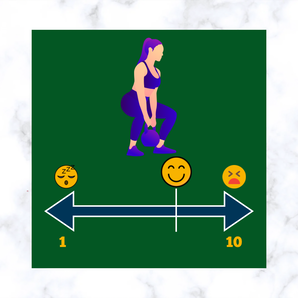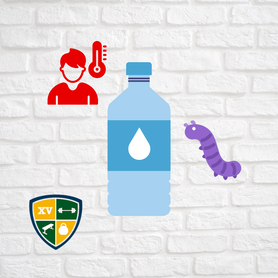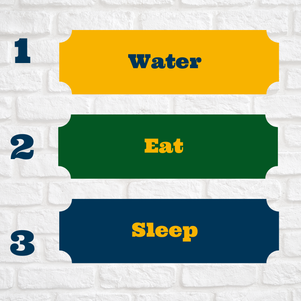|
Hi again everyone, today I’m here to talk about something that can feel very daunting to some and will often cause folks to just abandon their programs or maybe not take them as seriously, weight selection. For me, I’m not huge on taking percentages of a certain person’s ‘max lift’ or the like. I’m also not one that’s going to be testing out right single rep max lifts. I think there is absolutely a time and a place to use them, certain athletes and populations truly need something like that, but that’s not a population I deal with much. My preferred method for selecting weight is going by what many coaches refer to as RPE or Rate of Perceived Exertion or Rate of Perceived Effort. I’ll try to explain as briefly as I can. The scale works on 1 – 10, 10 being maximum effort, I usually say the hardest thing you’ve ever done in your life and 1 being so minimal effort it’s passive, usually I refer to this as being asleep. The target for this is to be around a 7 or an 8, as it’s been best explained, that means if you do the given number of reps written down on your program, you should have 2 reps or so left in the tank, preferably not more and certainly not less. Example, if I were to have Goblet Squats programmed for 8 reps, I should feel like I could do up to 10 by the time I perform rep number 8, but not more, with the weight I have. Make sense mostly? Here’s why I prefer this over percentages. There is this wild thing that most people have to deal with called life. When folks walk into 250 Cypress street, depending on what life has thrown at them, what felt like a 7 RPE on their Dumbbell bench press last week, might feel close to a 9 this week. With so many factors going into someone’s energy and ability levels for their workouts, sleep, stress, food, water, etc..., it allows folks to meet themselves where they are at for the day. My hope today, is that the next time you walk into your workout, if that Kettlebell RDL feels like you could do 1000 of them, this system will help turn on that light bulb to say, “oh I should increase the weight”. Course, the same goes for if the weight on your Lunges is so heavy you can’t do a single rep more once you’ve reached the desired number of reps, that switch flips and says, “I definitely need to go down on weight for these”. There are always exceptions, as most of you know, it depends on is a pretty common answer to most questions and problems, this is no different. Thank you very much for stopping by and giving your time today, please feel free to reach out with questions or comments, have a great rest of your week.
0 Comments
Hello all, today I want to build on last week’s post, specifically water, and include something that most will start experiencing soon if they haven’t already, that lovely sick bug season. It’ll be short and to the point, but still informative, so enjoy. Water does not just keep you cool and hydrated. This is something that goes out of people’s minds when the temperature starts to drop outside and things become much cooler. Folks think, of I’m not sweating so I don’t need water. Water helps with body temperature regulation both when it’s hot AND when it’s cold, so it’s certainly a good idea to keep pushing it, even when the temperature doesn't make you sweat instantly. The colder temps also mean that we see a bit more illnesses, what can help keep those away? Staying properly hydrated. You’ve likely heard some sort of term about drowning the sick bug (I think it was the flu specifically?) and there is some truth to that. Water is the primary vessel that carries all those important nutrients throughout your body, not only to help your recovery, but also to fight off those illnesses as best as you can. If those nutrients struggle to get to their destination because they don’t have the fluids to get them there, then yeah, your body will struggle to fight off the illnesses.
No, simply drinking your proper amount of water will not 100% prevent illness from getting to you, but answer this. If you could be sick just once (maybe twice) a year or constantly going form sick to better, sick to better again, which would you choose? I’m guessing you’d rather be up and on your feet doing the things you enjoy doing in your life, no? So, stay hydrated, for the sake of both your recovery and health this winter. Thanks for reading every and enjoy the rest of your week! Hello again everyone! It's a short one, but I think still important for you all to skim through. There’s been a saying in fitness, you can’t out train a bad diet. I would amend that to, you can’t out train a poor recovery routine for your goals. Fitness goals are not achieved in the gym, mostly. They are achieved in the recovery and everyday life routines. There’s 23 other hours in the day outside of the gym that make a bigger difference than what was done in the gym. Even if your goal is as simple as, I want to feel better. A poor recovery routine is going to make you feel like hot garbage more often than not, so there goes that simple idea. To me, recovery boils down to 3 main areas, food intake, hydration and rest or sleep. Let’s reign it back in for a moment though, because I am not one of these knuckleheads that does not understand, life just happens sometimes. Do I believe that you HAVE to achieve perfection in all three areas of recovery? Absolutely not. There will always be times that are less ideal than others for sake of recovery. What I am encouraging here is to simply stay on top of those as best as you can, if you hit 2 out of 3, you’re probably doing well. Even the magic 80% number that many use as an aiming point won’t always be that easy. Focus on the things you can control, aim to accomplish those 3 pillars to the best of your ability and the results will shine through, no matter what they are. Thanks again for your time today everyone, hope you have a great week and I'll be back again soon with more fun. |
Details
AuthorJarrod Dyke, CSCS Archives
July 2024
Categories |



 RSS Feed
RSS Feed